Brigade Commander Ivan Kochubey. Terrible for whites, inconvenient for reds
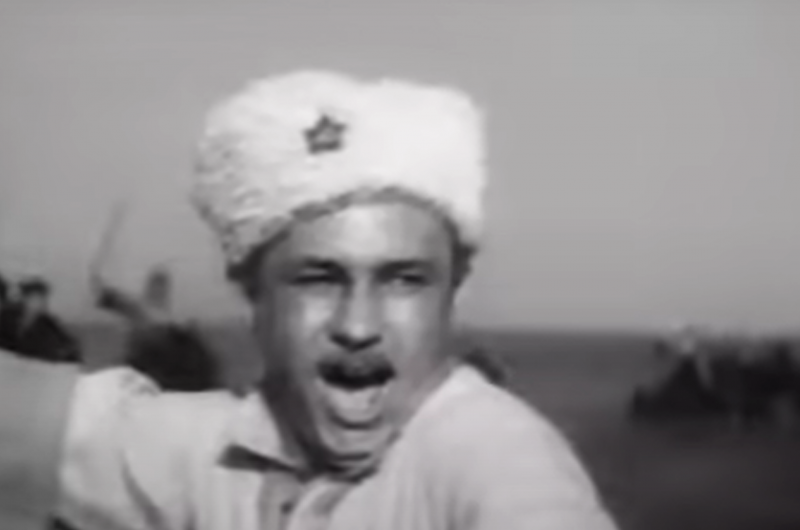
Frame from the film "Kochubey", 1958
The two revolutions of 1917 and the civil war that followed them brought many previously unknown people out of the shadows. Among them were not only professional revolutionaries, but also people who had not even thought about revolution before. There were real heroes, and professional adventurers, and bandits, who only covered themselves with revolutionary slogans.
The February Revolution found someone in the army, including some of the future legendary commanders of the Red Army. Alexander Parkhomenko got to the front in the summer of 1916 after a citywide strike in Lugansk and perceived the service as a punishment. But Semyon Budyonny, Vasily Chapaev, Ivan Kochubey served very well, had numerous awards, but they had no chance of becoming not only generals, but even officers.
The former platoon commander of the Eye of Gorodovikov, due to illness, was transferred to the Cossack hundred guarding the iron foundry in Sulin (Rostov Region). On the Black Sea navy Theodosius Shchus served as a sailor - in the future, the closest associate of Nestor Makhno. Klim Voroshilov, who had a serious revolutionary experience, worked in Tsaritsyn at a gun factory, which would later be named after him. Mikhail Frunze, also a professional revolutionary, was a statistician in the Zemsky Union.
Some future heroes of the battles of the Civil War were in prisons, and the line between "politics" and banal criminality was sometimes very thin. As an example, we can cite the Bessarabian "Robin Hood" Grigory Kotovsky, the anarchists Nestor Makhno and his associate Lev Zinkovsky (Zodov, Zadov), the famous expropriator Simon Ter-Petrosyan (Kamo).
The fate of these people was also different, who had no prospects in tsarist Russia, but were called by the revolution to the stage of the Russian and world stories. Some ended up at the pinnacle of power, like Budyonny and Voroshilov, or reached high military ranks, like Colonel-General Gorodovikov. Among them could be Nestor Makhno, holder of the Order of the Red Banner, who became an ally of the Bolsheviks three times, but, in the end, ended up in Paris, where he died at the age of only 45 years.
Some then died very early - at the peak of their careers. So, in 1925, Frunze died unexpectedly (he died on the operating table) and Kotovsky (killed by Meyer Seider, whom some call the former owner of a brothel in Odessa, others - the adjutant of Mishka Yaponchik). In July 1922, Kamo died under the wheels of a car, whom Lenin called "a man of absolutely exceptional devotion, courage and energy."
Very many heroes of the Civil War after its end were out of work - they simply could not adapt to civilian life, or could not accept the New Economic Policy (NEP), which was considered a betrayal of the ideals of the revolution. Among those were women. The sad fate of one of them is told in the story of Alexei Tolstoy "The Viper".
Ninel Myshkova as "Viper" (Olga Zotova), stills from the 1965 film:
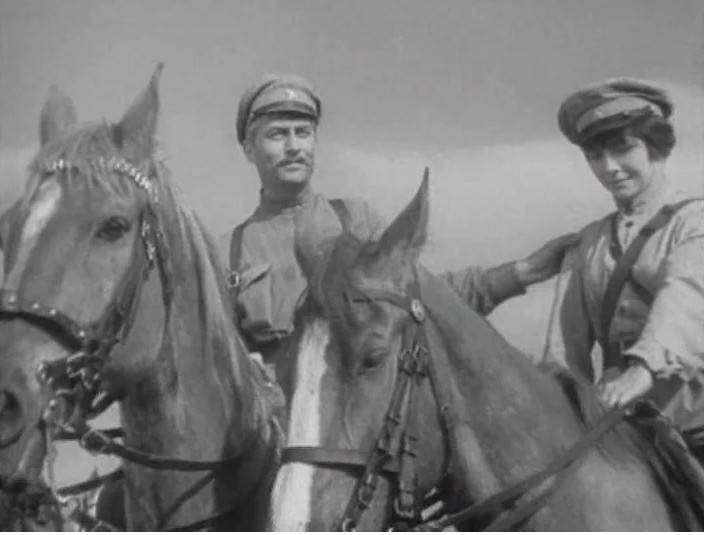
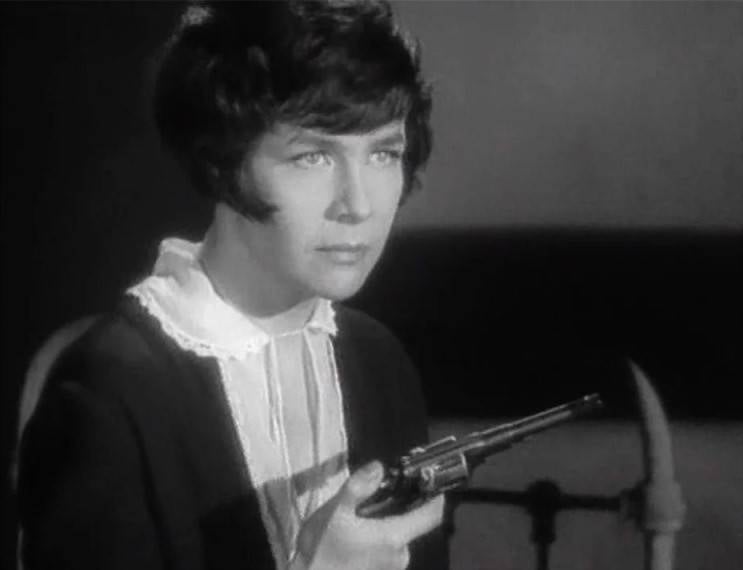
It is unlikely that this heroine of the film “Two Comrades Were Serving” would have accepted the NEP either:
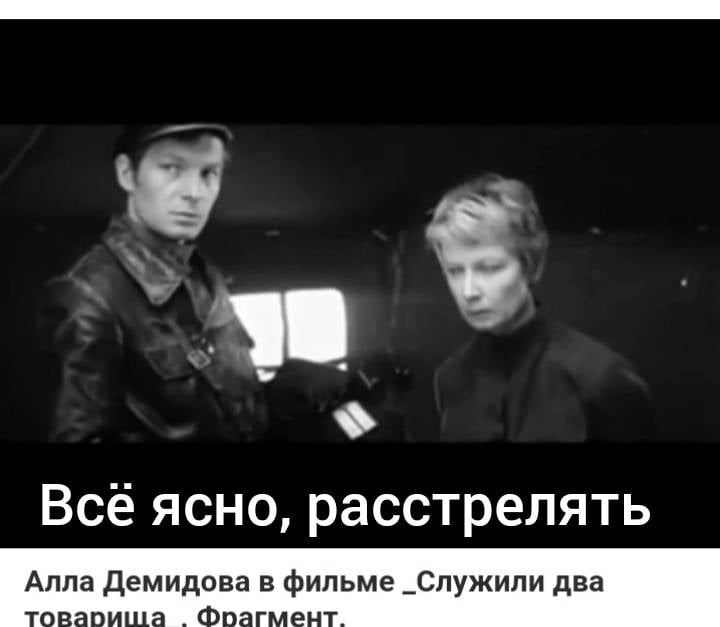
But she died during the assault on the Turkish Wall.
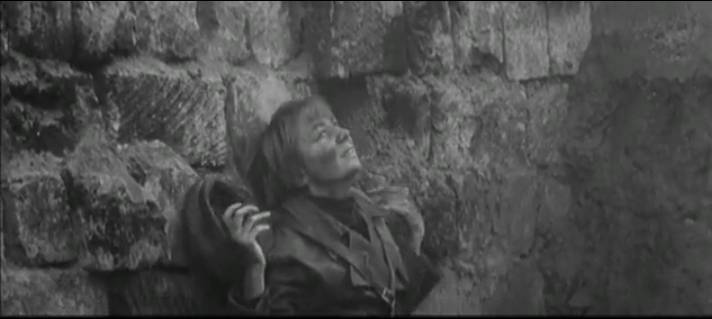
The former red commander in the film "At Home Among Strangers, A Stranger Among Our Own" simply suffers physically from the fact that he is forced to do accounting:
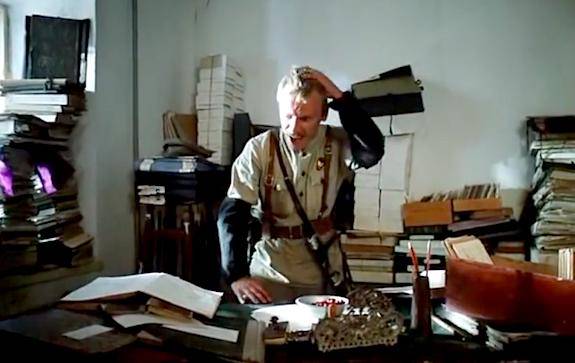
Frame from the film "At Home Among Strangers, Stranger Among Our Own"
And the most famous person who could not and did not want to take advantage of the fruits of his victory was Ernesto Che Guevara, who, having received the post of Minister of Finance, soon literally fled from the Island of Freedom: he fought for the ideas of socialism in the Congo and died in Bolivia.
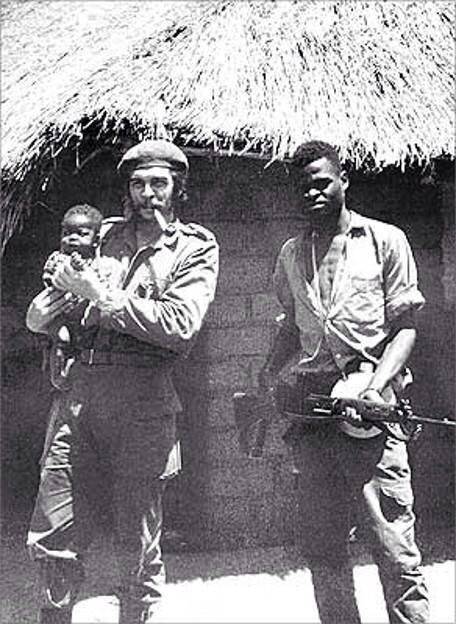
Che Guevara in Congo
But others, on the contrary, got a taste for it too quickly, could not stand the test of the power that fell on them and were convicted, many of them “under anti-Soviet articles”: investigators could not believe that these people, who, in a poor, half-starved country destroyed by the Civil War and so “everything was there”, they can steal simply out of greed, and not for the purpose of wrecking and sabotage.
Finally, during the Civil War, many famous or forgotten heroes died. Including four legendary red commanders, each of whom was shot in the USSR in a full-length feature film: Vasily Chapaev, Alexander Parkhomenko, Sergey Lazo, Ivan Kochubey. Vasily Ivanovich Chapaev is still remembered. Divisional commander Parkhomenko, who died on January 3, 1921 in a skirmish with Makhno's detachment, is almost forgotten.
Poorly remembered in Russia and actively trying to forget in Moldova, born there in the village of Pyatry Sergei Lazo, commander of the Trans-Baikal Front, partisan detachments, head of the Military Revolutionary Headquarters for preparing an uprising in Primorye, who was killed in May 1920.
Few people remember Ivan Kochubey - a very bright, talented, original, but ambiguous military leader and a man who in one year went from a tsarist constable to a revolutionary brigade commander, having been captured, refused the rank of colonel of the white army offered to him and died with the words :
It is about him that we will talk a little in today's article.
Ivan Antonovich Kochubey, life before the revolution
The hero of our article was born on the Roschinsky farm (now it is the territory of the Kochubeevsky district of the Stavropol Territory) on July 13 (25), 1893. He was the eldest of 10 children of his parents, and therefore he, one might say, did not have a childhood: looking after his younger brothers and sisters, caring for livestock, helping his mother with housework and his father in the field. In general, he had nothing to thank the tsarist government and personally the Emperor.
Ivan Kochubey did not go to school and was illiterate until the end of his life. Having already become a brigade commander, he marked the villages with crosses on the map, and the farms with two crosses. But from an early age, he was distinguished by independence, which was both a virtue (initiative, decisiveness) and a disadvantage (later, in command positions, he often acted as he saw fit, ignoring the advice of military experts and orders from his superiors).
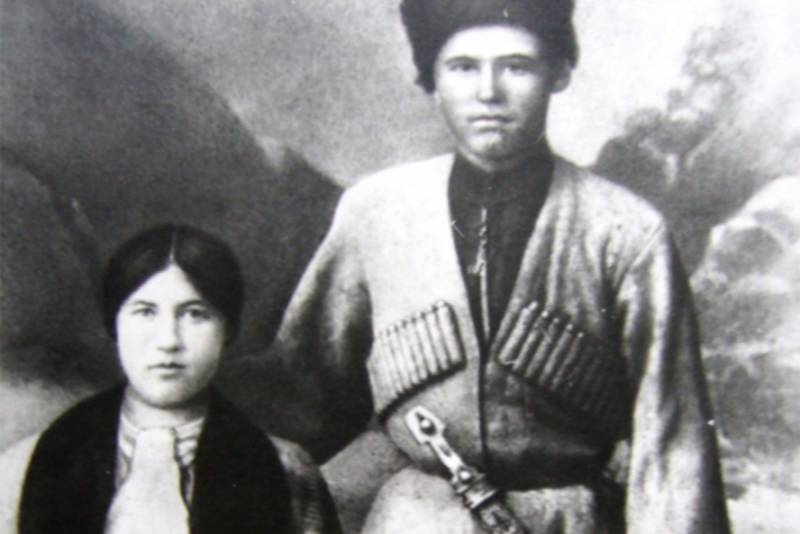
Ivan Kochubey with his wife
Ivan Kochubey was drafted into the army in 1915. He ended up in the consolidated Kuban Cossack regiment of the corps of General Bratov. The direct commander of Kochubey was Yesaul A. G. Shkuro (actually, his real name is Shkura), against whom he would later fight during the Civil War.
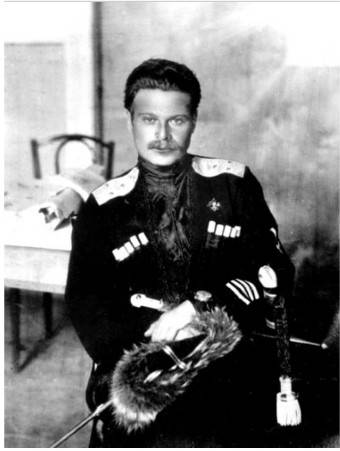
A. G. Shkuro
Shkuro formed the so-called "Wolf Hundred" from the Kuban Cossacks, which had a black banner with the image of a wolf's head, the soldiers wore hats made of wolf fur and imitated the wolf's howl with their battle cry.
It is curious that Shkuro, who went over to the side of the Germans during World War II, in March 1945 tried to recreate a special battle group "Wolf Squad", in which not one hundred, but as many as two thousand people were to serve, Colonel Kravchenko was to become the commander. But there was no time to implement this plan.
The end of the traitor was sad, but logical: on January 16, 1947, Shkuro, along with his accomplices (Krasnov, Domanov, Sultan-Girey Klych and others), was executed by the verdict of the Soviet court.
Let's go back to the First World War.
"Wolf Hundred" Shkuro then often acted behind enemy lines. Contemporaries left conflicting reviews about her. Wrangel, for example, assessed her actions, to put it mildly, not too highly.
At the beginning of 1917, the Shkuro detachment fought on the Caucasian front, carrying out raids on the Turkish rear in Iraq and Persia, even, they say, reached Mesopotamia. And Ivan Kochubey became a sergeant in two years of service and received, according to various sources, either two or three St. George's crosses.
Red Commander Ivan Kochubey
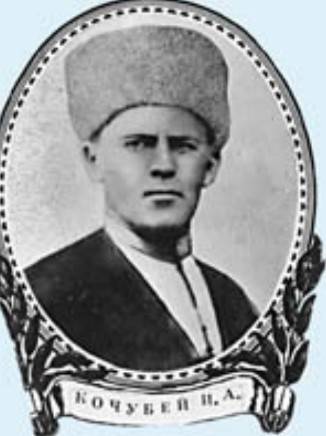
I. A. Kochubey
Shortly after the February Revolution, Kochubey returned home. After the victory of the Bolsheviks in October, he unconditionally joined the Reds. At the beginning of 1918, together with his brother Anton, he formed his own detachment, which in April 1918 was among the troops defending Yekaterinodar from the army of Kornilov (the First Ice Campaign). Then, in May, Kochubey's detachment fought the Germans near Bataysk.
Then Kochubey successfully operated on the territory of the modern Krasnodar and Stavropol Territories, the Astrakhan Region. In July 1918, he already commanded the Kuban Cavalry Brigade, then - then the Second Special Brigade of the 12th Army.
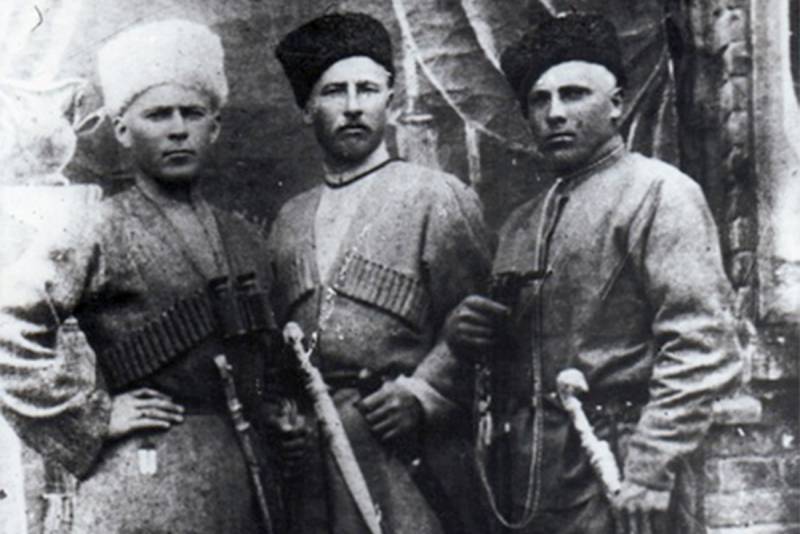
I. Kochubey (left, in his famous white hat), his deputy in the brigade Mikhailov and brother Anton
In the winter of 1918–1919 it was Kochubey's brigade that covered the retreat of the Red Army from the North Caucasus to Astrakhan.
It must be said that, being an uneducated and even illiterate person, Kochubey had the vaguest idea of military tactics, but he did not trust the military specialists assigned to him. And therefore he preferred frontal strikes, in which his units sometimes suffered unjustified losses. However, he was a bright passionate leader, knew how to captivate the fighters, did not spare himself, did not hide from bullets, and his subordinates loved him very much.
Moreover, he took care of his soldiers and even allowed “requisitions” to be carried out - not only from landlords and kulaks, but also from poor peasants - because after all, his fighters should not fight for these poor fellows, should they not be hungry and undressed? Once, seeing in Kizlyar uniforms and weapons piled up in a heap, which his fighters needed so much, Kochubey did not quarrel with the head of the army supply service, but simply silently shot him.
As a result, when the soldiers learned that the wounded Kochubey could not leave the city of Georgievsk captured by the Whites, they themselves, without any order, counterattacked the enemy, broke through to the infirmary and took out their commander.
At the same time, Kochubey was famous for his cruelty, and the whites trembled at the news that they would have to fight this brigade commander. From his subordinates, he demanded unconditional obedience. Once he forced the arbitrarily fleeing soldiers to fight off the abandoned position in their underwear and gave them only one rifle per company. This is surprising, but then White really retreated.
Kochubey also became famous for some naive childish tyranny. He never traveled in a car in his life, and therefore, when he saw him for the first time in Yekaterinodar, without thinking twice, he “requisitioned”, dropping off the commandant of the city and members of the revolutionary committee. Then "went to ride."
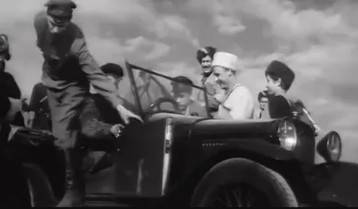
Frame of the feature film "Kochubey"
Being summoned to the authorities, he said: they say, think about it, “this is a matter of life”, give me time, I will give you ten of these cars” - just like Carlson, who promised ten thousand chandeliers in exchange for one broken one.
Fatal for Kochubey was the murder of Brigadier Commissar Askurava. The patience of the authorities ran out, and in February 1919 Kochubey was accused of arbitrariness, anarchy, disobeying the orders of the army leadership and removed from command.
Then began what we recently saw on June 24, 2023.
So, the Kochubey brigade received an order to disarm its fighters and arrest the commander. And Kochubey, in response, moved the brigade to Moscow, to Lenin - in order to talk with him, tell the leader of the world proletariat about the traitors who had dug in in the leadership of the army, and complain that they "sold" his soldiers.
By the way, having learned about this "march of justice", S. Kirov, who was in Astrakhan, ordered to find Kochubey and invite him to return to duty. The only airplane was raised into the sky, but he failed to find the rebellious brigade in the endless Volga steppes.
And the Kochubeevites went forward - cheerfully and with songs. Until February 18, 1919, near Promyslovka, they stumbled upon the Red Army units lined up against them. Here, the subordinates of Kochubey had some "enlightenment in the mind", and they declared that "they will not go against their own." At the rally (it’s good that it wasn’t at the mysterious “council of commanders”), it was decided not to go to Moscow, but to Tsaritsyn - apparently because Belarus was very far away, and Alexander Lukashenko was not its leader at that time.
Some of the soldiers, led by the centurion Latyshev, somehow, with great difficulty, reached this city. And the detachment of Kochubey, who fell ill on the road with typhus, lost his way and went out to the superior forces of the whites. On behalf of Denikin, the captured brigade commander was offered the rank of colonel of the Volunteer Army, but he refused, stating:
On March 22, 1919, he was hanged on the market square in the city of Holy Cross (now Budyonnovsk). Before the execution, a sign was hung on the chest with the inscription: “Bandit Kochubey. Torturer of the Russian people.
Recall that before this, Kochubey was long and persistently persuaded to become a "noble" and a senior officer of the White Army. He was declared a "bandit" and "torturer of the Russian people" only after he rejected this tempting offer.
It was possible to hang the proud red commander only the second time - the first rope broke. At the time of his death, he was only 25 years old.
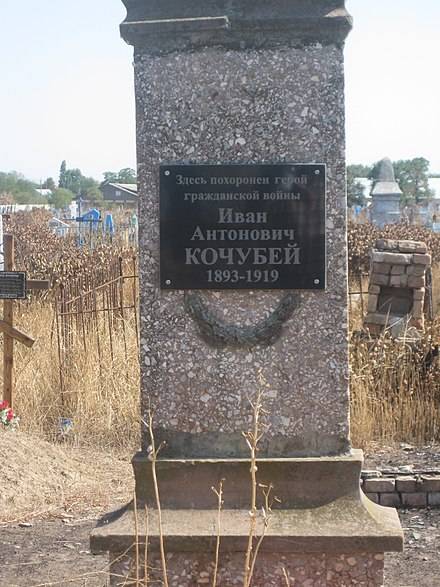
Grave of Kochubey
Perhaps it was thanks to this heroic death that the rebellious brigade commander Kochubey was allowed to become (and remain) a national hero of the Civil War. A district in the Stavropol Territory, several villages and towns, streets in different cities were named in his honor, several monuments were erected.
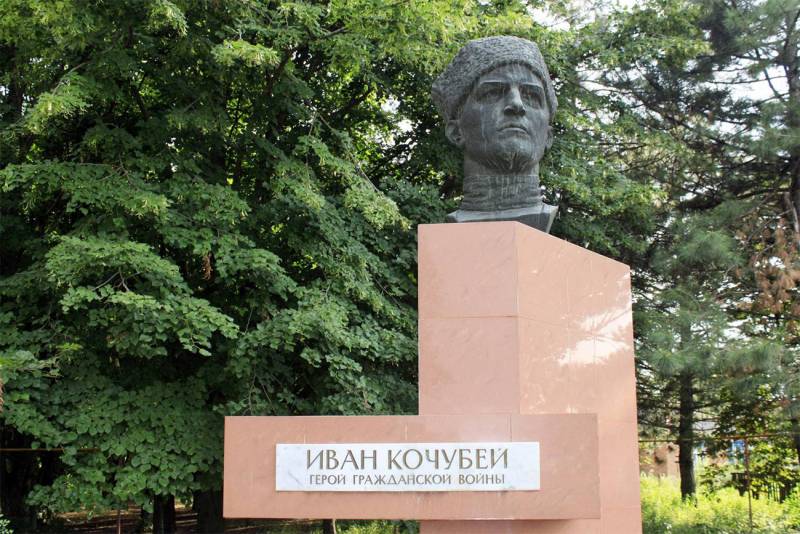
Monument to Kochubey in the village of Tikhoretsk
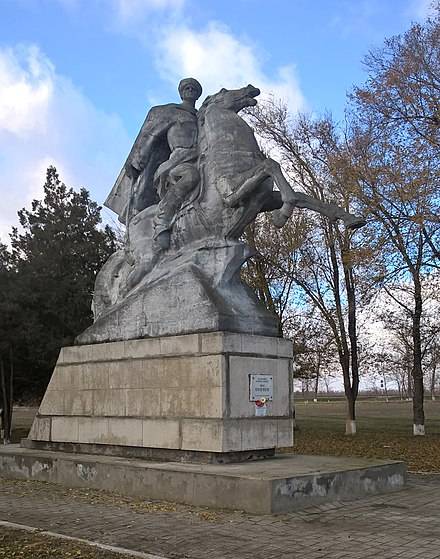
Monument to Kochubey in the village of Beisug
In 1937, A. Perventsev wrote the novel Kochubey, based on which the film of the same name was shot at the Lenfilm studio in 1958. The main role in it was played by the actor Nikolai Rybnikov, one of the main idols of that generation of Soviet people.
One of the streets in the Ukrainian city of Chernivtsi also received the name of Kochubey. But in October 2015, the red brigade commander was included in the “List of persons who fall under the law on decommunization,” published by the infamous Ukrainian Institute of National Remembrance.
Information